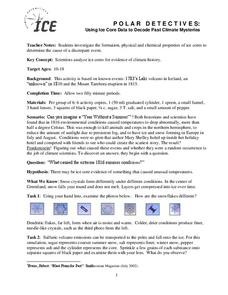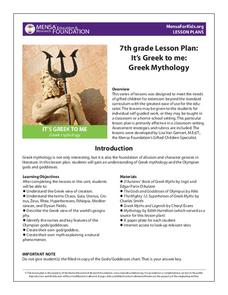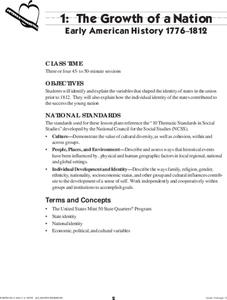Constitutional Rights Foundation
Winner-Take-All: The Two-Party System
Two's company, three's a crowd. High school historians learn about the Electoral College, a two-party, winner-take-all voting system in the United States. The lesson plan explains the pros and cons of the two-party system, roadblocks for...
Minnesota Department of Natural Resoures
Minnesota’s Forests
The forests of Minnesota provide middle schoolers with an integrated learning opportunity. They examine the three biomes and their histories, conduct experiments, read stories, and draw pictures. A lovely lesson about trees.
Alabama Department of Archives and History
America in Space: German Voices from Huntsville, Alabama
Project Paperclip, the Redstone Arsenal, and the Huntsville Space Center are all featured in a resource that investigates the contributions of Dr. Werner von Brawn and other German scientists to the US space program. Working individually...
Edible Schoolyard
Pan de los Muertos
Accompany instruction and the celebration of El Dia de los Muertos with a loaf of Pan de los Muertos. Here, scholars measure ingredients precisely to create tasty bread, write a remembrance for someone who has passed away, and take part...
Polar Trec
Polar Detectives: Using Ice Core Data to Decode Past Climate Mysteries
How does examining an ice core tell us about weather? Learners set up and explore fake ice cores made of sugar, salt, and ash to represent historical snowfall and volcanic eruptions. From their setups, scholars determine what caused the...
Polk Bros Foundation
American Presidents
Emanuel Leutze's painting Washington Crossing the Delaware. Alexander Gardner's photograph of Abraham Lincoln. What do these works of art tell us about the character of these American Presidents? After examining the techniques the...
Smithsonian Institution
Borders within the United States: Indian Boarding Schools and Assimilation
Native American Nations ... sovereign entities or removable tribes? A thought-provoking lesson explores the relationship between Native American tribes and the United States, including forced assimilation and removal from their ancestral...
Smithsonian Institution
Re-Segregation of American Schools: Re-Segregation
Examine the re-segregation of public schools in a thought-provoking resource. Young scholars read articles and primary sources, complete worksheets, and watch a video to explore the idea that desegregation made schools more segregated....
Smithsonian Institution
Fighting For Freedom: The Stono Rebellion and Free Frank McWhorter
Travel back in time to the Stono Rebellion. Young historians research historical figures who played a role in African Americans' fight to escape slavery. Scholars research material, complete handouts, participate in group discussion, and...
Curated OER
It’s Greek to Me: Greek Mythology
Here you'll find a great collection of worksheets to supplement your instruction of Greek mythology, including informational texts on the Olympian gods and goddesses, a matching quiz, graphic organizers, and myth-writing activities.
PBS
Understanding and Applying the Miranda Decision
How does the Supreme Court Miranda decision affect court cases? Scholars watch a video about the decision, discuss its application in various cases, fill out multiple handouts, and work in groups to better understand how much weight the...
Smithsonian Institution
Borders and Community: Early 20th Century Chicago Neighborhoods and Ethnic Enclaves
Chicago is one city, four neighborhoods, and countless nationalities. The lesson explores the ethnic division of Chicago in the early twentieth century. Academics read primary sources, analyze maps, and tour an online exhibit to...
Smithsonian Institution
Separate is Not Equal: Fight for Desegregation
Separate is not equal! An eye-opening lesson delves into the past to understand the fight for desegregation and how it impacted African American communities. Academics complete two one-hour lessons using documents, photographs, and...
Smithsonian Institution
Resistance to School Desegregation: The Boston Busing Crisis
Despite how it sounds, Boston's busing crisis wasn't a transportation problem. Academics address the problems faced by African Americans following school desegregation and the struggle to receive equal educational opportunities. Scholars...
Smithsonian Institution
Strength in Solidarity: Coalition of Immokalee Workers and the Campaign for Fair Food
Not all food is created equal. The lesson dives into the world of migrant farm workers to show their struggles to earn livable wages and better working conditions. Academics learn why the Coalition of Immokalee Workers was created and...
Cleveland Museum of Art
Japanese Folktales (Asian Odyssey)
The Cleveland Museum of Art presents this interdisciplinary model unit that asks class members to explore how the same themes are presented in the folktales and art of several cultures.
Channel Islands Film
Island Rotation: Lesson Plan 1
How do scientists provide evidence to support the theories they put forth? What clues do they put together to create these theories? After watching West of the West's documentary Island Rotation class members engage in a series of...
Dick Blick Art Materials
Stitch It Up!
Ever think about combining the art forms of painting and embroidery? Then this art instructional activity is right up your alley! Given a piece of white cloth, young artists first create a grayscale painting and then highlight certain...
Story Corps
The Great Thanksgiving Listen
StoryCorp provides a resource that captures and preserves the remembrances of family or community elders. Prior to the Thanksgiving holiday, class members select a person they want to interview, record the conversation, and then upload...
Education Outside
Papermaking
Imagine recycling food scraps and using them to make paper. The directions are all here in a seven-page packet that details several paper-making strategies.
NASA
Cosmic Microwave Background
Begin your next class with a BANG! Pupils discuss the formation of our universe and its expansion before proceeding with an activity designed to demonstrate what most likely occurred billions of years ago. They conclude with a discussion...
Royal Society of Chemistry
Aspirin—The Wonder of Medicine
What do aspirin and the willow tree have in common? Scholars of chemical synthesis engage in a fascinating reaction to make their own aspirin samples. The lab uses thin layer chromatography analysis, includes stoichiometric calculations,...
Curated OER
Moon Mining
Go on a moon mining expedition from the safety of your classroom with this space exploration simulation. Using simple models of the moon's surface prepared ahead of time by the teacher, young scientists are challenged with locating and...
US Mint
The Growth of a Nation
Young historians explore the identity of the early United States in this four-part instructional activity series. Working in groups of three, students research the political, economic, and cultural atmosphere of each member of the...
Other popular searches
- Us History Aztecs
- Us History Crossword Puzzles
- Us History Progressive Era
- Ap Us History
- Genealogy & Us History
- Us History 1920s
- Us History, Thomas Edison
- Us History, Oregon Trail
- Us History Timeline
- Us History Time Line
- Us History Colonial Period
- Us History Immigration

























